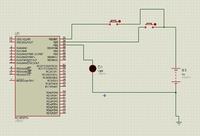mmahfuj
Junior Member level 2

- Joined
- May 31, 2012
- Messages
- 23
- Helped
- 0
- Reputation
- 0
- Reaction score
- 0
- Trophy points
- 1,281
- Location
- Chittagong,Bangladesh
- Activity points
- 1,491
I wanna make a project named "Automatic Room Light Controller with visitor counter for single door" using PIC microcontroller(16f877a). I did a programme for it and it is not for single door. Would you please help me by giving the logic of mikro c code for the single door(not for one entrance and another exit door, only for one door). Please help me....I need it badly..if anyone wish to send me the source code(full) then you can send me to this email ID: ""




